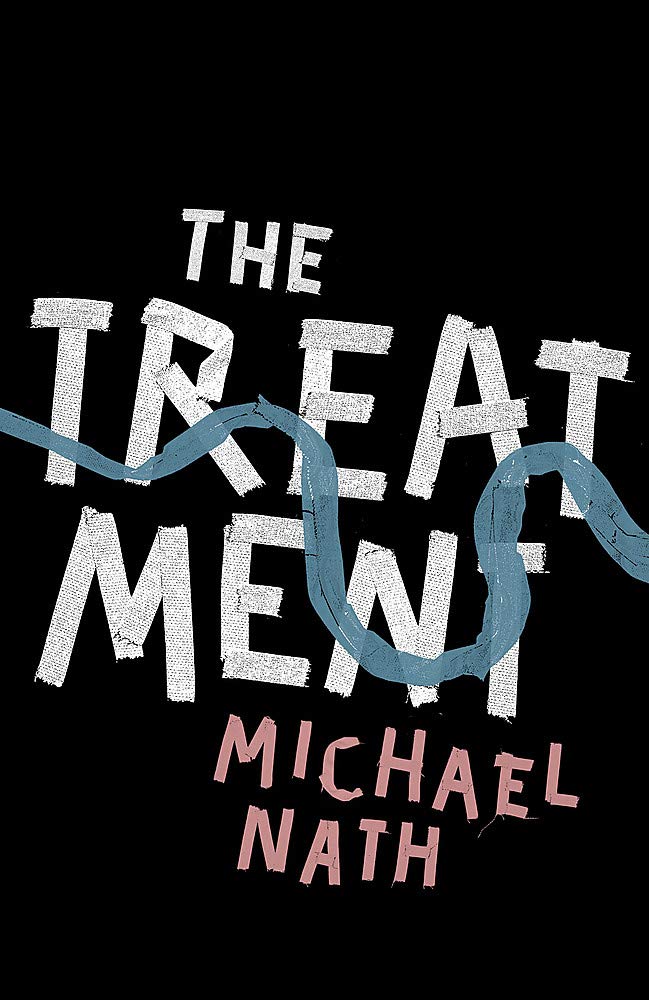Style is not disguise, it is imaginative transformation, even sorcery. It turns people, actions, into other forms, even calls them into being; then the reader is interested neither in what was there before, nor whether anything was there at all, only in what she/he is seeing, hearing, feeling now.

(Afterword to The Treatment, Michael Nath)
The question that looms largest in my mind after finishing The Treatment is how come Michael Nath isn’t better known?
As you no doubt know by now, I am constantly on the lookout for novels that do interesting, subversive, experimental things with genre, that demonstrate a belief that is strong in me, that it isn’t what you write, it’s how you write it. A feel for language, a desire to communicate, a powerful sense of empathy, a joy in the formal possibilities of words on the page – any of these can turn base material into literary gold. Luckily for British crime writing, Michael Nath has all the above, and more.
The Treatment follows journalist Carl Hyatt, who some years before the novel opens made the mistake of riling up a dodgy property developer named Michael Mulhall. The end result of this misadventure is that Carl gets fired from his job on the G**** (a left-leaning broadsheet we all know which one) and winds up working for the Chronicle instead, a free local newspaper that has big ambitions but zero resources.
Unsurprisingly, Carl is unable to let go of his resentment of Mulhall, and a chance encounter during a holiday in Spain leaves him with the simmering suspicion that there may be more to the story even than he realised. He has promised his wife Karen that he’ll steer clear of trouble – but Carl’s lingering horror over a crime that took place in the neighbourhood two decades before leaves him no option but to investigate further. Was Mulhall linked to this crime and if so, how? And what might be done to bring the remaining original perpetrators – still walking free – to justice?
Carl’s belief in putting his money where his mouth is is all well and good as an ideal – but what if it gets people killed? The Treatment examines questions of decades-long guilt, the morality of revenge, and the relative worth of truth in a landscape where the pursuit of that truth is liable to put those closest to you in mortal danger.
The bare bones of this novel might be the bones of any one of a hundred contemporary crime novels. The substance of this book is unlike any other crime novel – or novel, period – I’ve yet encountered. There is frequent mention of the playwright Christopher Marlowe, murdered in a tavern in Deptford (The Treatment takes place mainly in southeast London, which as a former resident of that neglected parish would be recommendation enough in itself) and these references are no accident – if I’m sure of anything about this novel it’s that Nath does nothing by accident. The vigour, the fruitiness, the rambunctious, squalid life of this teeming text – the heightened register of language, which has at the same time the music of street slang with all its contemporary resonance – kept reminding me of Marlowe’s Faustus, of Webster’s sordid revenge tragedies, of the blood and guts of Elizabethan London, so little different, in essence, from own own.
It’s a big book (500 pp) and very dense. The novel opens with a cast list as extensive as Tolstoy’s in War and Peace – but don’t let that put you off. In fact, you won’t need the cast list because this book is like a soap opera you might have stumbled upon mid-season: tricky to work out what’s going on for the first half hour or so but stick with it and you’ll find yourself addicted before you know it. The novel’s time-frame is dizzyingly fluid, dipping back and forth between the present, the immediate past and the cusp of history, elusive and mercurial. You might feel like you’re running to keep up on occasion, but Nath’s sure-footed virtuosity in the handling of his material means the moment will come when you’re swept up in the action, flipping pages to find out what happens like your sanity depends on it.
For lovers of true crime literature, The Treatment is equally indispensable as a unique and visceral response to the twisted and troubled aftermath of the Stephen Lawrence Inquiry, an examination of systemic racism, an evocation of London society and culture on the cusp of great change. The Treatment is Shakespearean in scope, Dickensian in potency, Joycean in technical ambition.
The Treatment is Oldboy down the Old Kent Road. It’s a piece of work. Dive in.